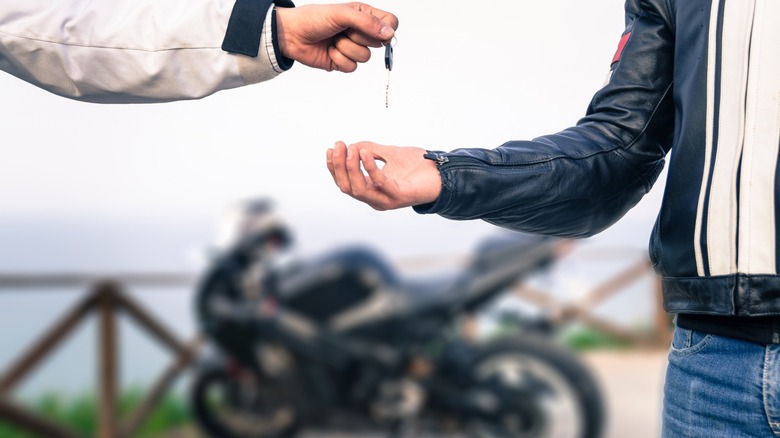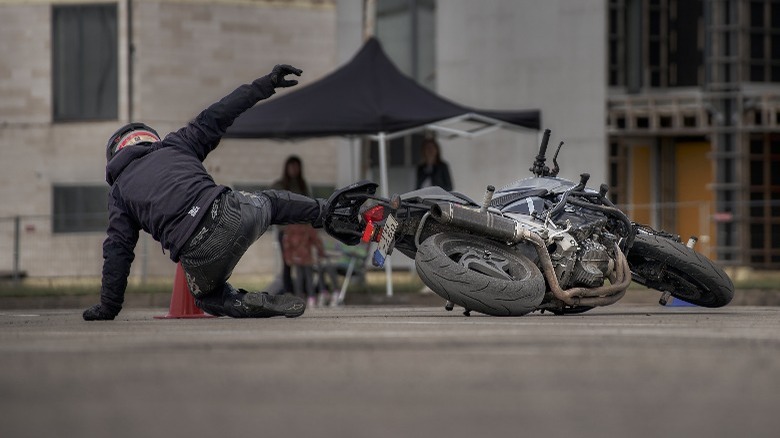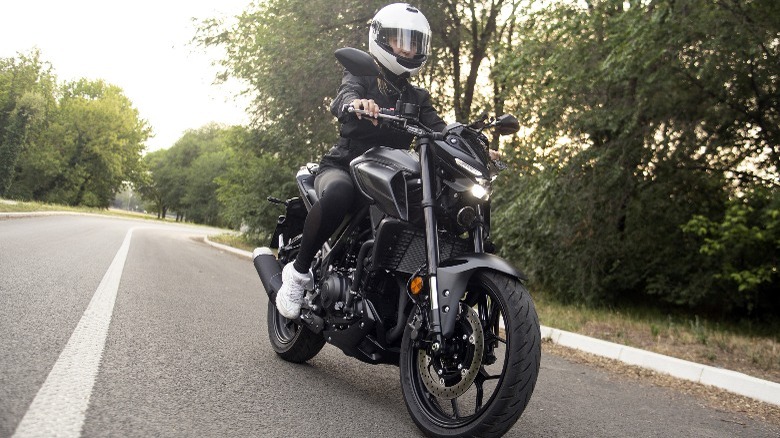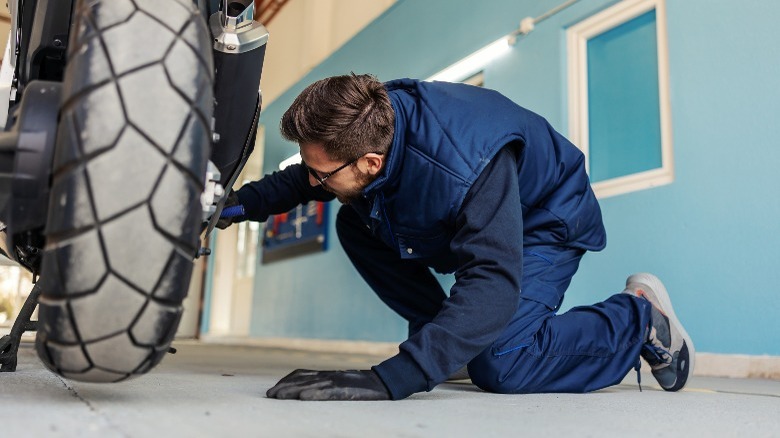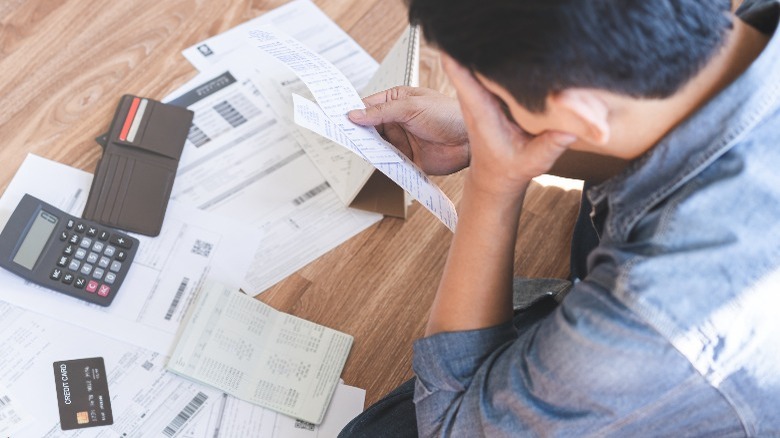5 Mistakes People Make When Shopping For Used Motorcycles
Buying a used motorcycle can be a great and affordable way to get into the world of motorbikes. Not only do they typically cost significantly less than new models, but it's not uncommon to find quality bikes with relatively low miles, especially if you're searching for smaller motorcycles for beginners. However, as is the case with buying a used car, shopping for a used bike comes with its share of risks, and there are several things you need to know before buying a used motorcycle.
For many people, buying a motorcycle is an impulsive decision. But even if it's the result of decades of dreaming and planning, buying a bike can present unexpected challenges and setbacks. No matter how experienced you are, mistakes are sometimes inevitable. Fortunately, most people make some variation of the same mistakes when shopping for a used motorcycle. That makes these errors easy to predict and, consequently, fairly easy to avoid.
The biggest issue is simply remembering all of the steps and precautions you need to take when buying a used bike. That's why we composed this article. Think of it as a checklist to help ensure that you avoid a few common mistakes so you can get the bike you want with minimal hassles and obstacles. So, from failing to understand your own limitations to skipping the test drive and forgetting about your finances, here are the five most common mistakes people make when shopping for used motorcycles.
Failing to understand rider limitations and needs
One of the biggest mistakes people make when shopping for used motorcycles is failing to understand their own limitations and needs. That's especially true for new riders who don't have much experience with motorcycles. Learning to ride a motorcycle is significantly different from learning to drive a car. While both experiences present their own challenges, motorcycles are unique due to the way rider and bike size affects the process.
Even the smallest drivers can handle most of the largest vehicles, thanks to adjustable seats and steering wheels. Large motorcycles, on the other hand, are much more difficult to control, even for moderately experienced riders. Because of that, it's important that you search for a manageable bike that matches your needs. It's understandable that new or even experienced riders may crave the speed and adrenaline that come with large motorcycles, and we know how tempting it can be to jump at the opportunity to buy the first cool looking 1000cc bike that you find. But it's vital that you understand your limitations and needs before buying a used motorcycle.
If you're a new rider, you should stick to smaller bikes between 125cc and 500cc. If you're an experienced rider, you still need to consider your size and capabilities. Finally, you need to understand the different types of motorcycles and the style of bike you plan to buy. Failing to understand those factors and simply buying the first cool-looking motorcycle you find could result in various consequences, including ending up with a bike you can't ride or one that doesn't meet your needs or expectations.
Not doing enough background research
Another common mistake people make when shopping for used motorcycles is not doing enough research into the bike's background. That largely boils down to the fact that many people don't realize the full extent to which they need to investigate. The first step is to get as much information about the bike's history as you can from the owner. Ask about any damage or mechanical problems, why they're selling, whether it's been in an accident, and if they have maintenance records. The owner can be a great source of information. But, due to their desire to sell, owners can also be a source of misinformation or downright dishonesty, which is why it's important not to stop with this first step.
You should also request a motorcycle history report. Many people are familiar with CARFAX, the site dedicated to generating vehicle history reports covering things like prior accidents, repair information, maintenance, and whether the car has ever been stolen. CARFAX is one of various websites devoted to providing this service, but many people are unaware that you can also search for motorcycles on these sites using the VIN. Most of these services come with a fee. However, there are some free options out there, and looking into this information is vital when searching for a used motorcycle — after all, you don't want to dump money on a bike only to learn that it's stolen.
The last step is one that a lot of people overlook. In addition to doing the above, you can't forget to research the model you plan to buy. This information is just as important as the bike's individual history and includes things like reliability ratings, fuel mileage, top speeds, and common problems.
Skipping the test drive
Another common mistake that people — especially new riders — make when buying a used motorcycle is skipping the test drive. Experienced riders with an active license should always test drive the motorcycle themselves when shopping for a used bike. If the owner refuses to let you drive the bike, you should assume there's a mechanical flaw that they're trying to hide. Even if an owner is simply overprotective, you can't risk spending your hard-earned money on a motorcycle when you don't even know if you'll enjoy riding it.
If you're a new rider, the situation is a bit more tricky. If you don't yet have a motorcycle license, the owner is unlikely to let you test drive the bike. Even if they do allow you to drive the bike, they may not let you leave the parking lot or take it on high-speed roads. Furthermore, you put yourself at risk if you drive a motorcycle without a license. If you get into an accident or damage the bike in some way, you won't have insurance to cover you, and you may face legal repercussions for driving without a license.
But none of that means you should skip the test drive. Instead, you should bring someone who knows how to ride motorcycles and holds an active license with you. A trusted friend or a mechanic are great options for this role, and during a test drive, an experienced rider should be able to tell if anything is obviously wrong with your used motorcycle's engine and handling.
Failing to get an inspection
Just like the test drive, a pre-purchase inspection is something you absolutely should not skip when shopping for a used motorcycle. Unfortunately, many people do make the mistake of skipping the inspection or performing it inadequately. If you're not a motorcycle expert, it's important that you bring one with you when checking out a used bike. There are several things you need to look for during your inspection, and if you don't have the right know-how, you could miss an obvious and expensive defect.
When inspecting a used motorcycle, you should look for signs of damage. A lot of motorcycle accidents go unreported, and physical damage can be an indicator that the bike was in a wreck or dropped on its side at some point. Look at things like the fenders, handlebars, and foot pegs. If these components are bent, scuffed, or broken, the bike may have been in an accident or dropped.
You'll also want to look at mechanical parts. Look for leaks around the engine, rust on the chain, and damage to the frame. Remember to check the clutch line, brake levers, and chain tension. Next, check all of the fluids. Inspect the oil and coolant for discoloration and contamination, and check to make sure the fuel tank is in good condition.
Finally, don't forget to start the engine and check any and all electrical components. Inspect the lights, horn, electric start feature, and the digital instrument cluster if applicable. It's a good idea to arrive early when inspecting a used motorcycle, as it's important to see whether the bike is capable of starting cold, as well as how long it takes to crank when the engine isn't warm.
Forgetting about the financial aspects
Another common mistake that people make when shopping for used motorcycles is forgetting to take their financial situation into account. Buying a bike is a big expenditure. If you're not prepared financially, buying a motorcycle, even a used one, can have horrible effects on your wallet and bank account. You need to consider not only the up-front cost of the bike, but also how much you'll need to pay just to get started riding. That means things like insurance, license fees if you don't already have a driving permit, and the cost to purchase safety gear, like a helmet, jacket, and gloves.
Next, you'll need to consider the long-term costs and whether or not you're prepared to handle them. Those longer-term expenditures include things like motorcycle maintenance, repairs, replacement parts, and, of course, continued insurance payments. It's vital that you understand what owning a motorcycle entails and that you're financially prepared to handle the expenses for the long term.
